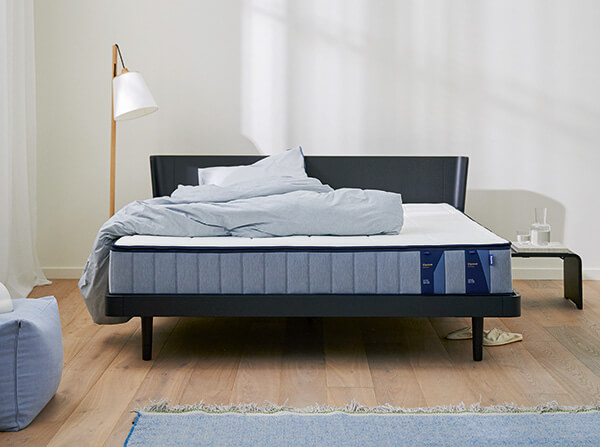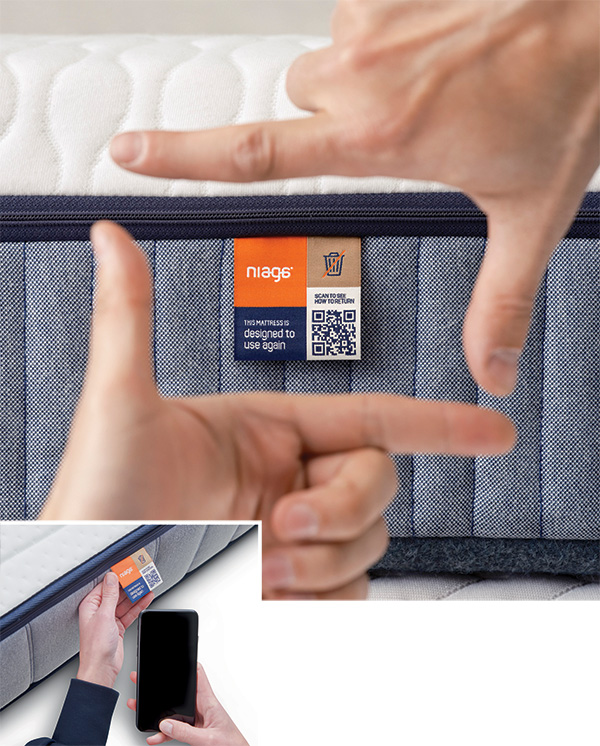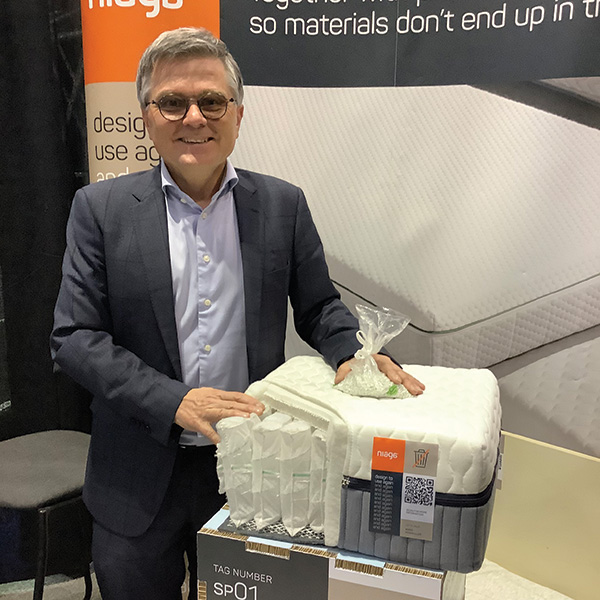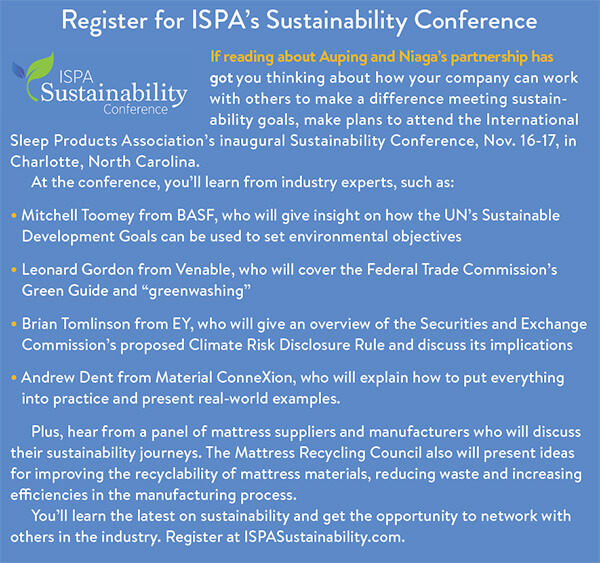Auping and Niaga teamed up to create upcycled mattresses that make the most of materials and reduce waste.
When it comes to mattress recycling, there’s a big sticking point: the complexity of separating the different materials used to build and hold a mattress’ comfort and support layers.
This challenge was top of mind for two Dutch companies — Deventer-based bed producer Royal Auping and Geleen-based circular materials and solutions provider Covestro Niaga B.V. — when they teamed up in 2018 based on a connection made through their involvement with the Ellen MacArthur Foundation. Founded in 2009 in Cowes, England, the foundation’s mission is to develop and promote the concept of building a circular economy, where economic activities such as production are restorative or regenerative by design and materials are reused repeatedly rather than being discarded or destroyed.
A circular economy reduces material use, redesigns products to be less resource intensive and recaptures waste as a resource to manufacture new materials and products. Both Niaga (which stands for “Again,” read backward) and Auping are committed to making this goal of reducing mattress waste a reality within their businesses, creating an “upcycle” model where materials are easily disassembled at the end of the product’s use for processing into new bedding components or recycled into new raw material for other uses at the same quality level.
“We started with a simple joint innovation project and a non-disclosure agreement,” says Ward Mosmuller, director of partnerships and alliances for Niaga. “We had a unique, patented, ‘click-unclick’ adhesive technology (also called Niaga) we’d developed for carpets that we believed could also be a good fit for mattresses.”
Auping had a similar vision for creating a fully circular mattress, where every part can be reused rather than discarded, says Pim Jansen, the company’s manager of international business development. So Auping and Niaga combined their resources to pursue this circular goal.
Before joining forces with Niaga, Auping had been working on creating a circular mattress for several years, Jansen says. “Niaga’s click-unclick adhesive provided the missing link for us in solving the biggest challenge we had faced: how to bind layers together while still allowing for easy detachment and separation of materials after use.”
According to Mosmuller, products made with Niaga click-unclick adhesive are designed and built in such a way that their components can be decoupled for easy refurbishment and reuse. The technology features granules of polyester that are melted by heating and cooled to bond parts together then heated again to pull them apart.

“Niaga is a nontoxic, reversible adhesive that binds all the elements of a product together safely and securely,” says Inga Arling, who joined Niaga as circular business development manager this spring after nearly five years as category manager with Auping.
After use, the Niaga click-unclick adhesive can be reheated to decouple the parts cleanly, making the materials recyclable and suitable for use in future products.
“In most mattresses, the components are glued together, making it difficult to separate the different materials after use. With the Niaga reversible adhesive, every component can be separated independently and recycled,” says Arling, who is charged with developing partnerships with other bedding makers interested in incorporating Niaga technology into their lines.
Niaga is part of Leverkusen, Germany-based Covestro, a leading supplier of premium polymers focused on the circular economy. Covestro acquired Niaga from Dutch chemical giant DSM in 2021.
“I was amazed when I saw a demonstration of a mattress made with this adhesive go through the disassembly process for the first time,” Jansen adds. “The heat makes the entire mattress quickly come apart.”
A true collaboration
Auping’s new line of circular mattresses was developed in close collaboration with Niaga. Niaga was charged with finding ways to adapt its click-unclick adhesive to mattresses; Auping focused on designing and efficiently producing a new type of sleeping surface using mono-material polyester in place of polyurethane foam for all support and comfort layers along with the click-unclick adhesive.
The collaboration was guided by Niaga’s three core product design principles, Mosmuller says. Keep it simple, using the lowest possible diversity of ingredients; use only “clean,” easily recyclable materials; and use reversible connections, which bind different materials together while still allowing for easy disconnection at the end of each use phase.
The project required leveraging both companies’ know-how in the areas of manufacturing, material science and circular product design to create a fully recyclable, highly comfortable product capable of delivering the same or better level of sleep as other more traditional mattresses on the market. Both companies created small internal teams dedicated to the project, sharing information and ideas on a regular basis via video chat and in-person meetings.
“We found that Niaga shared a similar philosophy about sustainability and how to achieve it, and that common ground helped our teams collaborate very efficiently and creatively,” Jansen says.
To produce a circular mattress that can be fully recycled, Auping limited the number of materials to two basic components: steel and polyester. The steel is used for the foundation and springs, and PET-fiber polyester provides the building block for every other element in the mattress, from the support and comfort layers to the ticking and the zipper. All the components are designed to be easily joined and separated through the use of Niaga’s reversible adhesive, or in some cases, polyester yarn.

“We worked closely with key suppliers to come up with replacements for the conventional polyurethane foams we’d been using,” Jansen says, adding that the bulk of the company’s line prior to this project consisted of beds with hybrid innerspring and PU foam constructions. Its new circular bed designs feature polyester comfort layers and spacer fabrics, polyester-pocketed springs and other polyester fiber components, all of which can be easily identified, separated and recycled at the end of a mattress’ lifecycle.
One company Auping turned to for help with its new constructions was Innofa, which has been supplying knitted polyester ticking and comfort layers to the mattress maker for decades. Based in Tilburg, Netherlands, with additional operations in Eden, North Carolina, Innofa worked with Auping to develop new materials created solely with polyester. Other key European partners involved in the project included Müller Textil (spacer fabrics), Agro International (innersprings), Coats Opti (zippers), EE Labels (labels), Enkev (natural fibers), TWE (nonwoven fabrics) and Vebe (needlefelt padding).
“The success of a new venture like this requires a high level of cooperation across the entire value chain,” Jansen says. “From suppliers to retailers, everyone needs to do what they can if we’re to achieve a fully circular product life where there is no more waste and all the raw materials from a product can go back into making a new mattress again.”
Evolve leads the way
Auping introduced its first circular mattress, Evolve, to the market in 2020. Made with just steel and various formulations of polyester, but with no foam and the Niaga adhesive replacing glues, Evolve was honored with a Red Dot Award — an international design competition for product design, communication design and design concepts — during the year of its launch. That same year, Auping also received the annual Circular Business Award from the Dutch government in recognition of its efforts.
While Evolve received kudos for its sustainability, it took time for retailers to get behind the new mattress, according to Jansen. “We had to educate our retailers about what this product was all about,” he says. “We had to show them that not only was this an environmentally friendly mattress, it also was a good bed to sleep on. In the end, a bed’s ability to provide quality sleep is what drives sales. Sustainability is important, but it’s not the defining feature.”
Through consumer and retailer research, Auping also learned that, to be successful, Evolve had to be more than a single-model proposition. “Our first offering only had one basic model with three firmness levels,” Jansen says. “It was hard for retailers to support this because it’s just one product sitting there alone on the floor. Retailers needed a bigger range to show to their customers.”
To give consumers a wider range of choice, Auping developed a bed-match system for Evolve. The system centers on four body types, which are defined by the relationship of shoulders and hips to the waist. Each of these body type options is offered with its own unique zoning, along with three different levels of firmness, for a total of 12 choices, he says.
“Having this range allows the retailer to better match the bed to the individual,” Jansen says, adding that the company has remerchandised most of its mattress line to reflect this new approach, and that sales have steadily grown ever since. “Consumers like having several beds within a line to compare so that they can experience a range of feels.”
Based on the success of Evolve, Auping aims to make its entire product range, including other items such as bed frames, circular by 2030 at the latest. In pursuit of this goal, it recently introduced two other recyclable mattress models — Elysium and Elite.
Fully circular with its polyester and steel-only construction, Elysium features an innovative comfort layer called Harmony-pocs that ensures good pressure distribution, air circulation and moisture regulation. This layer is made up of more than 800 mini-springs individually packed in small textile bags that provide the feeling of being hugged, according to the company. Elysium is positioned at the opening price points of Auping’s line, with Evolve in the middle range.
Elite, priced at the premium end of the Auping line, is 80% circular (capable of being recycled and used again for the same purpose) and 20% recyclable (capable of being recycled and used again for other purposes). It features a comfort layer made of 100% natural Vita Talalay Origins latex with no artificial additives. The mattress also has an extra layer at the top with Welcompadd padding that provides extra softness close to the body. Elysium and Elite, like Evolve, are available in four body type configurations and three firmness levels, he says.
Circular mattresses now account for the bulk of Auping’s sales, according to Jansen. In his opinion, the ability of these products to deliver quality sleep also is higher than the company’s previous constructions. “First, they are more breathable with better ventilation than the models they’ve replaced. In addition, these models are being marketed with the new body-typing system we have, which enables individual consumers to find a much better match for their needs.”
The ‘Product Passport’

As part of the marketing of these new beds, each fully circular model carries a Niaga tag that informs the buyer that the product is designed to be used again. The tag includes a scannable QR code leading to additional information, including a “Product Passport,” which is a list of all the materials that go into making the bed, as well as instructions for how to return the mattress when the consumer is ready to replace it.
“The tag tells the consumer, and later in the process the recycler, exactly what’s in the mattress,” says Niaga’s Mosmuller. “It’s just like the labels we see on food products, where all the ingredients are listed. It’s total transparency — and peace of mind — for the consumer.”
In addition to these product labels, Auping is providing retailers with a range of tools to help communicate the benefits of this new type of construction to consumers, and offers detailed information on its website, as well as videos.
For the recycling part of the equation, both Auping and Niaga have initiated a number of pilot programs with recycling specialists. As part of these pilots, Auping has begun collecting used mattresses turned in by consumers to stores, sorting and separating the innerspring and coil steels, and various levels of polyesters at its own production facility before turning them over to its local recycling partners.
“Collaboration across the entire industry, including suppliers, manufacturers and retailers, as well as recyclers, is a critical element in the successful transition to circular mattress production,” Jansen says.
To make it easy on consumers who buy its new circular beds, Auping also takes back old polyurethane foam mattresses. After separating the materials by type, PU foams are returned to Retourmatras, a Dutch recycling company that turns the old mattress foam into bonded foam for use in sound insulation, underlay and artificial grass cushioning.
The European Bedding Industries’ Association estimates that more than 35 million mattresses are disposed of each year in Europe alone, the majority of which are incinerated. With this new approach, mattresses will be retrieved and recycled so that existing materials are kept in use rather than having to be produced again from more oil-based virgin materials that, after use, are thrown away.
Going forward, both Niaga and Auping will be looking for new partners to join the circularity bandwagon. Niaga is currently licensing its click-unclick adhesive for use by six other bed makers in Europe, including Araam (Canada); Auping, Hespera and M Line (the Netherlands); Revor (Belgium); and Spaldin (Spain). Spaldin introduced Möebius, its new circular mattress collection, at the Winter Las Vegas Market, marking the first time a circular mattress has been shown and sold in the United States.
Niaga also exhibited its technology at this year’s ISPA EXPO, where a variety of U.S. producers stopped by its booth to learn more about the unique properties of its click-unclick adhesive.
“We saw a lot of interest in this new technology among the manufacturers who visited with us, but they also had a lot of questions,” Mosmuller says. “That’s natural with anything new, since it’s unfamiliar and you want to know how it functions.”
According to Mosmuller, Niaga works closely with all its partners to help them overcome any bumps in the road. “Anything we learn during the course of this journey to circularity, we will share,” he adds. “Over time, producing these types of mattresses will become cheaper and faster, and the same will happen on the recycling side as more facilities come on stream. Also, the lessons we learn in other applications of the Niaga adhesive and technology — i.e., carpets and furniture panels — will contribute to the transition to a circular economy.”
Auping is aiming for a complete production and recycling loop to be in place for its mattresses starting in 2026. At its headquarters, it operates a small-scale disassembly operation where it is learning how to efficiently take apart mattresses of circular design.
Auping and Niaga also are expanding their cooperation with organizations that have knowledge and experience with developing infrastructure for recycling PET polyester. In a few years, they hope that as more mattresses are being returned and recycled, more operations of this type will be scaled up to meet growing demand.
While Niaga is handling all of the licensing of its technology, Auping also is available to consult with manufacturers looking for insights into circular product design and production techniques. At this point, Auping has no plans to sell its own products in the U.S. market.





